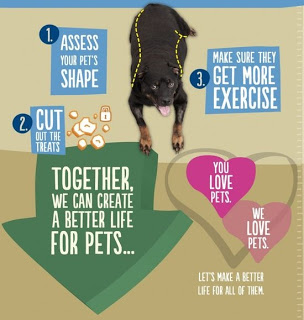Dogs
by Dr. Julie Buzby
Welcome to our All Things Dog Blog series on proactively helping your dog live a longer, healthier life! It's intentional that our first blog post on this topic is about weight management.
Did you know that you can directly influence your dog's life span through caloric intake? It's true.
Leaner animals live longer. In 2001, a fourteen year, landmark study in Labrador Retrievers proved that maintaining dogs' ideal body condition extended their life span by 15 percent, which translated into nearly two years.








- Ask The Vet About Nail Care + Posture
by Dr. Julie Buzby, DVM Buffercourtesy ToeGrips.com Nail Care the Right WayDuring 2014, I’ve been contributing posts in a series titled, “Ten Tips for Fido’s Longest Life.” To date, we’ve covered topics such as weight management, dental...
- Ask The Vet: Finicky Eaters
by Dr. Julie Buzby courtesy TWM News via Flickr.comDear Dr. Julie, My Lab/Sharpei mix was adopted in February after 8 months there. Apparently she had eating issues while living there. It took about 2 months to get her eating somewhat better at home....
- 10 Tips For Fido's Longest Life
by Dr. Julie Buzby courtesy Dr. BuzbyI’m smitten with my dog Luke. And like most of you, I want my dog to live forever. I dream of growing old with my husband, children and grandchildren, and our beloved rescue mutt. While immortality...
- Help Your Pet Recover From Obesity
Among humans, the problem of obesity is very real. Among pets, obesity is a problem often overlooked. Based on the Association for Pet Obesity Prevention’s (APOP) 2008 Pet Obesity Study, “an estimated 50% of dogs and cats in the United States are...
- Want To Give Your Pet A Treat? Dont Overfeed Him!
By Carol Johnson Many pet lovers think they can easily show their dog or cat how much they love them by giving them a treat and rubbing their belly. But too many of those treats, and that belly will get bigger and bigger. Which is a sad state of...
Dogs
Leaner Pets Live Longer
by Dr. Julie Buzby
 |
| courtesy psda.uk.org |
Did you know that you can directly influence your dog's life span through caloric intake? It's true.
Leaner animals live longer. In 2001, a fourteen year, landmark study in Labrador Retrievers proved that maintaining dogs' ideal body condition extended their life span by 15 percent, which translated into nearly two years.
In addition to living longer, lean dogs stay healthy longer! Fatty tissue produces inflammatory hormones which cause chronic inflammation. This persistent inflammation can lead to osteoarthritis, heart disease, diabetes, and certain types of cancers. Additionally, excess weight often results in lethargy, injury, and chronic pain.
One out of every two adult dogs is overweight, as defined by being 15% above ideal weight. What is ideal?
I prefer to consider body condition score, a hands-on assessment of weight based on frame, as opposed to straight body mass. Here's the gold standard:
- Ribs easily palpable, with minimal fat covering
- Tapered waist observed behind the ribs when viewed from above (Your dog should not look like a rectangle or oval.)
- Abdomen tucked up when viewed from the side
The scoring system used by The Ohio State University College of Veterinary Medicine is illustrated here.
Studies have also shown that it's never too late for your dog to benefit from a controlled weight loss plan. Consider these tips:
- Find a way to emotionally connect with your dog that doesn't involve food. (Might I suggest long leash walks?)
- The amount of food recommended on commercial packaging is generally way too much for our sedentary adult dogs.
- Actually measure the amount you feed with a real kitchen measuring cup, not a coffee can or ceramic mug.
- Two 10-minute walks per day don't equate to an active lifestyle. Weight loss requires reducing caloric intake below caloric expenditure. Increase your dog's exercise!
- I've heard people complain that their dog got fat after being spayed or neutered. The procedure itself didn't result in obesity, but desexing will decrease your dog's metabolism by up to 35%. Feed accordingly.
- The calories from treats add up quickly. Instead, try green beans, cauliflower, or raw baby carrots.
- Substitute cooked green beans for a portion of your dog's calorie-dense food. I had two Saluki patients who always had a "salad" before dinner.
As with all of your dog's health needs, consult your veterinarian about your dog's weight. Your veterinarian can scientifically calculate your dog's daily caloric requirement. Pets who are "dieting" should be weighted frequently for monitoring. Most veterinary facilities allow clients to stop in and weigh a pet during office hours without an appointment. Also, most veterinary practices can provide you with a computerized print out graphing your pet's weight history. I recommend hanging this on the refrigerator for motivation.
Your dog can't open the pantry for a midnight snack. You control the destiny of his/her girth. You have the power to dramatically improve both the quantity and quality of your dog's life!
Dr. Julie Buzby is a homeschooling mom of seven, American Veterinary Chiropractic Association and International Veterinary Acupuncture Society certified holistic veterinarian, and passionate advocate for canine mobility. She can be found on Twitter @DrBuzby and on Facebook.com/ToeGrips, as well as in our Ask the Vet Archives at the Pet Solutions menu bar item.
Dr. Julie's opinion or advice does not replace an actual exam with a veterinarian.







- Ask The Vet About Nail Care + Posture
by Dr. Julie Buzby, DVM Buffercourtesy ToeGrips.com Nail Care the Right WayDuring 2014, I’ve been contributing posts in a series titled, “Ten Tips for Fido’s Longest Life.” To date, we’ve covered topics such as weight management, dental...
- Ask The Vet: Finicky Eaters
by Dr. Julie Buzby courtesy TWM News via Flickr.comDear Dr. Julie, My Lab/Sharpei mix was adopted in February after 8 months there. Apparently she had eating issues while living there. It took about 2 months to get her eating somewhat better at home....
- 10 Tips For Fido's Longest Life
by Dr. Julie Buzby courtesy Dr. BuzbyI’m smitten with my dog Luke. And like most of you, I want my dog to live forever. I dream of growing old with my husband, children and grandchildren, and our beloved rescue mutt. While immortality...
- Help Your Pet Recover From Obesity
Among humans, the problem of obesity is very real. Among pets, obesity is a problem often overlooked. Based on the Association for Pet Obesity Prevention’s (APOP) 2008 Pet Obesity Study, “an estimated 50% of dogs and cats in the United States are...
- Want To Give Your Pet A Treat? Dont Overfeed Him!
By Carol Johnson Many pet lovers think they can easily show their dog or cat how much they love them by giving them a treat and rubbing their belly. But too many of those treats, and that belly will get bigger and bigger. Which is a sad state of...
